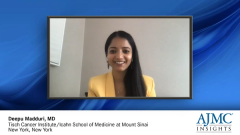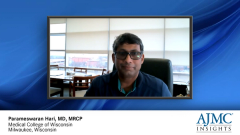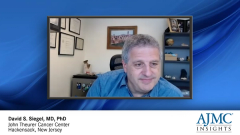
Treatment Gaps in Relapsed/Refractory MM
Current treatment challenges in relapsed/refractory multiple myeloma, as highlighted by healthcare professionals, and the rationale for exploring CAR T-cell therapy as a newer treatment modality.
Episodes in this series

Parameswaran Hari, MD, MRCP: In relapsed/refractory multiple myeloma [RRMM] some of the main challenges for treatment include the lack of effective agents at the end of the MM journey for the patient. Early relapses are relatively easier to treat because we have multiple agents. However, when we get to a stage in MM that we call triple-class refractory, or sometimes penta-refractory, which means a patient is essentially refractory and not responding to the 3 major groups of drugs we have, which are the IMiDs, or immunomodulatory drugs, PIs or proteasome inhibitors, and the CD38 monoclonal antibodies. At that stage, patients have run out of very effective agents that can give deep, long-standing remissions. Therefore, the lack of those agents is the single most important concern to a patient who is triple-class refractory. Relapsed/refractory myeloma implies that the patients have relapsed after prior responses, and that they’re refractory to at least 1 or more agents. It’s always a challenge when the patient is refractory, but the more refractory the patient gets, the challenge is even higher.
Deepu Madduri, MD: The biggest gap for multiple myeloma is that it has a high unmet need. It is the third most common blood cancer, accounting for about 10% of all hematologic cancers. What’s interesting is that despite all the new agents that we have, we still haven’t reached a cure for MM. For these patients, if they’re relapsed and refractory, they have a median overall survival [OS] of less than 12 months. As such, what we need to do is try to find a way to cure this disease.
David S. Siegel, MD, PhD: Patients with triple class-refractory myeloma are a significant issue right now. I believe there are 2 big issues in the myeloma world, which include: What do we do with high-risk patients? And what do we do with patients who become triple-class refractory? These are the opposite ends of the spectrum when we get introduced to patients with MM. For those patients who are triple-class refractory, we don't have many great options.
Recently we've had a couple of new drugs approved, including selinexor and belantamab, which have made it possible to achieve good responses in a subset of patients. We have the option of doing salvage transplants, so it is not an area that is completely barren. However, it is obviously a very difficult situation when the main classes of drugs that we use have failed. Notably, bringing in effective therapies, particularly ones that can give protracted remissions, is the key to what we do all the time. I think CAR [chimeric antigen receptor] T cells certainly fit into that category, and they also fit into the category of what we do for the high-risk patients early on during the course of treatment.
Newsletter
Stay ahead of policy, cost, and value—subscribe to AJMC for expert insights at the intersection of clinical care and health economics.







